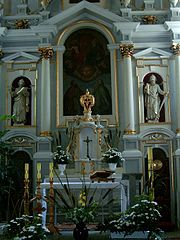
A History Of The Mass And Its Ceremonies In The Eastern And Western Church -Rev John O'Brien A.M.
CHRISTMAS DAY AN EXCEPTION
Christmas day is now the only day of the year upon which a plurality of Masses may be said. On this great feast the Church extends to every priest the privilege of celebrating the Holy Sacrifice three times the same morning, without, however, binding him to celebrate any more than one, if he does not wish to do so. According to Durandus (Rationale Divin., p. 419, No. 17), this privilege was granted by Pope Telesphorus, A.D. 142. Liturgical writers assign to these three Masses the following mystic meaning: first, the eternal birth of the Son of God in the bosom of his Father; secondly, his birth in time in the womb of his Immaculate Mother; thirdly, his spiritual birth in the hearts of the faithful by a worthy reception of his sacraments, but, above all, by the reception of himself in the adorable sacrament of the altar (Benedict XIV., De Festis Dom. Nostr. J. Christi, No. 668; Bouvry, Expositio Rubr., i. 437).
Throughout the kingdom of Aragon, in Spain (including Aragon, Valentia, and Catalonia), also in the kingdom of Majorca (a dependency of Aragon), it is allowed each secular priest to say two Masses on the 2d of November, the Commemoration of all the Faithful Departed, and each regular priest three Masses. This privilege is also enjoyed by the Dominicans of the Monastery of St. James at Pampeluna (Benedict XIV., De Sacrif. Missæ, Romæ, ex. Congr. de Prop. Fide, an. 1859 editio, p. 139). This grant, it is said, was first made either by Pope Julius or Pope Paul III., and, though often asked for afterwards by persons of note, was never granted to any other country or to any place in Spain except those mentioned. For want of any very recent information on the subject I am unable to say how far the privilege extends at the present day. A movement is on foot, however, to petition the Holy Father for an extension of this privilege to the universal Church, in order that as much aid as possible may be given to the suffering souls in Purgatory.
Copyright ©1999-2023 Wildfire Fellowship, Inc all rights reserved

 Keep Site Running
Keep Site Running